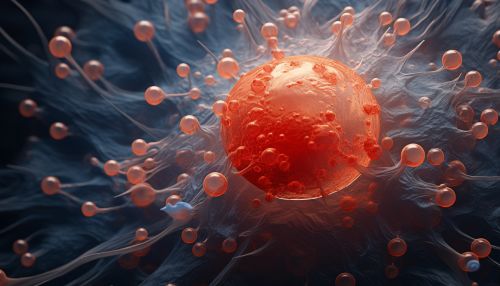Lymphocyte
Introduction
A Lymphocyte is a type of white blood cell in the Vertebrate immune system. They are the main type of cell found in Lymph, which prompted the name 'lymphocyte'. They are distinguished by their large nuclei.
Types of Lymphocytes
There are three general types of lymphocytes: B cells, T cells, and natural killer (NK) cells. The development and function of B and T cells are different, but they are similar in that they both are capable of recognizing specific targets.
B Cells
B cells are lymphocytes that are produced in the bone marrow and mature into cells that produce antibodies. The antibodies are released into the blood and lymph systems where they bind to the target antigen to mark it for destruction.
T Cells
T cells are lymphocytes that mature in the thymus. They are involved in cell-mediated immunity, which is an immune response that involves the activation of immune cells to fight infection. There are several types of T cells, each with a different function.
Helper T Cells
Helper T cells assist other white blood cells in immunologic processes, including maturation of B cells into plasma cells and memory B cells, and activation of cytotoxic T cells and macrophages.
Cytotoxic T Cells
Cytotoxic T cells are able to kill cancer cells, cells that are infected (particularly with viruses), or cells that are damaged in other ways.
Natural Killer Cells
Natural killer cells are a part of the innate immune system and play a major role in defending the host from tumors and virally infected cells. NK cells distinguish infected cells and tumors from normal and uninfected cells by recognizing changes of a surface molecule called MHC (major histocompatibility complex) class I.
Development of Lymphocytes
Lymphocytes are derived from hematopoietic stem cells in the bone marrow. They undergo a process of differentiation, which involves a series of changes in gene expression that are triggered by various transcription factors.


Function of Lymphocytes
Lymphocytes are vital for the immune response. They are responsible for the adaptive immune system, which provides the body with lasting immunity against pathogens. They recognize foreign substances (antigens) and mount an immune response against them.
Disorders Involving Lymphocytes
There are several disorders that can affect lymphocytes, including lymphocytic leukemias, lymphomas, and lymphocytosis.
Lymphocytic Leukemias
Lymphocytic leukemia is a type of cancer that starts in cells that become lymphocytes in the bone marrow. The cancer (leukemia) cells start in the bone marrow but then go into the blood.
Lymphomas
Lymphoma is a cancer that begins in the lymphocytes of the immune system. The two main types are Hodgkin lymphomas and non-Hodgkin lymphomas.
Lymphocytosis
Lymphocytosis is a condition that often results from an infection and is characterized by an increased level of circulating lymphocytes.
